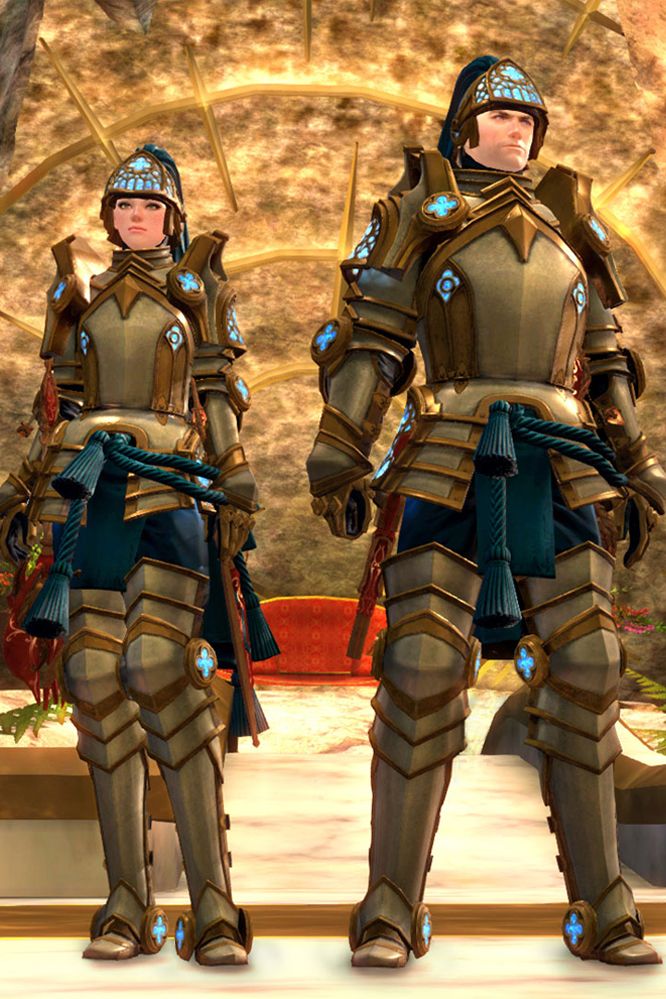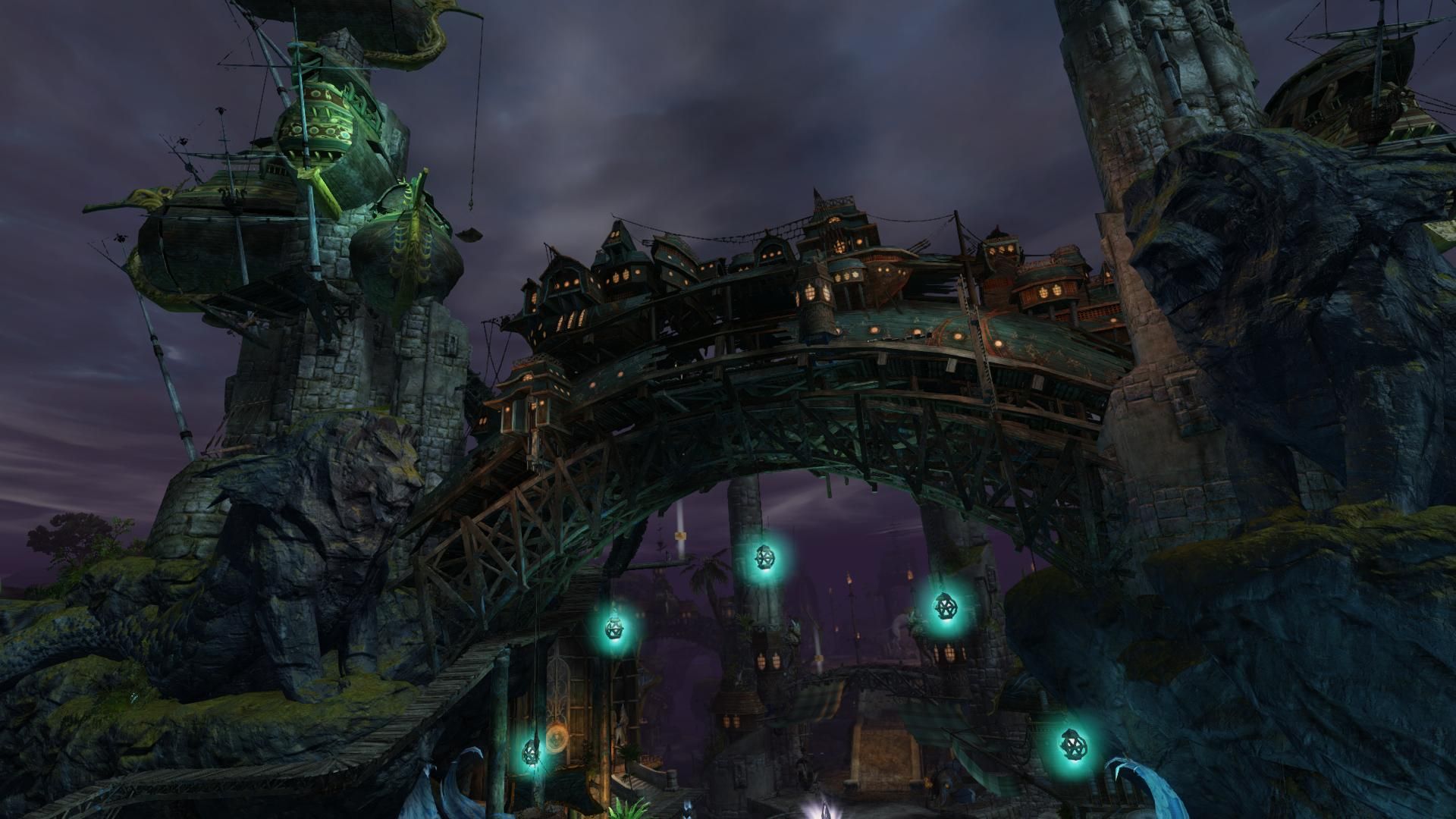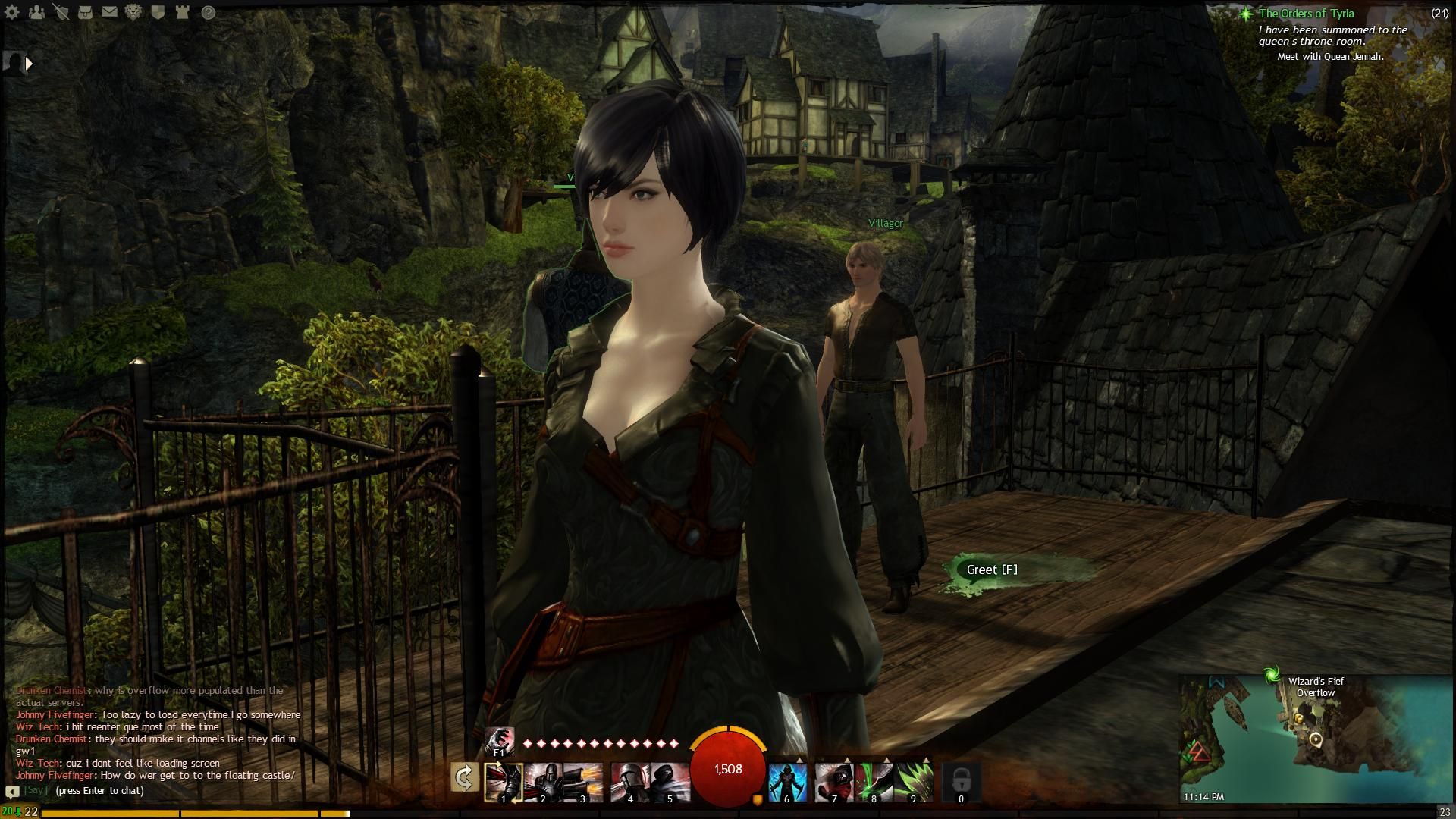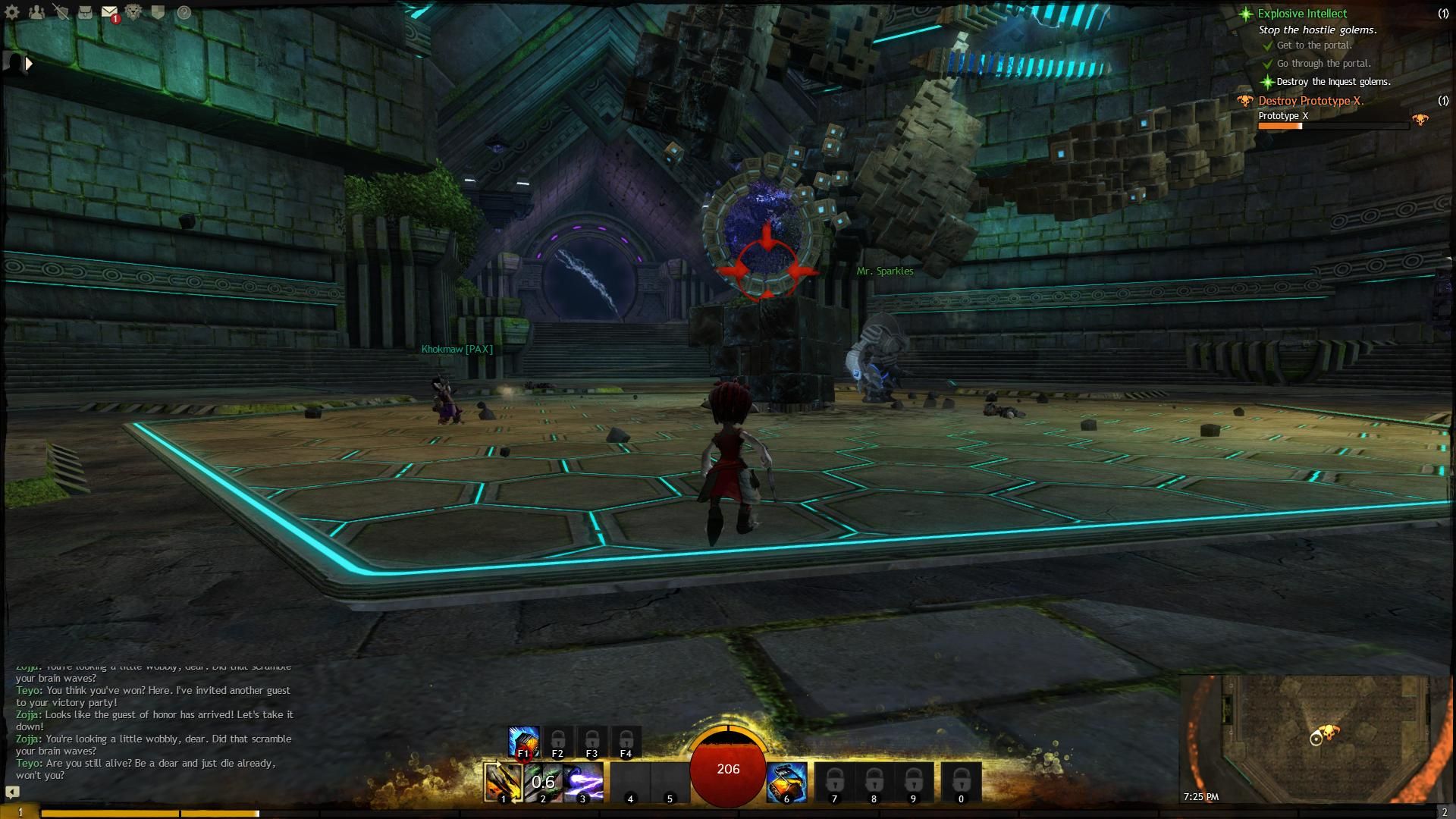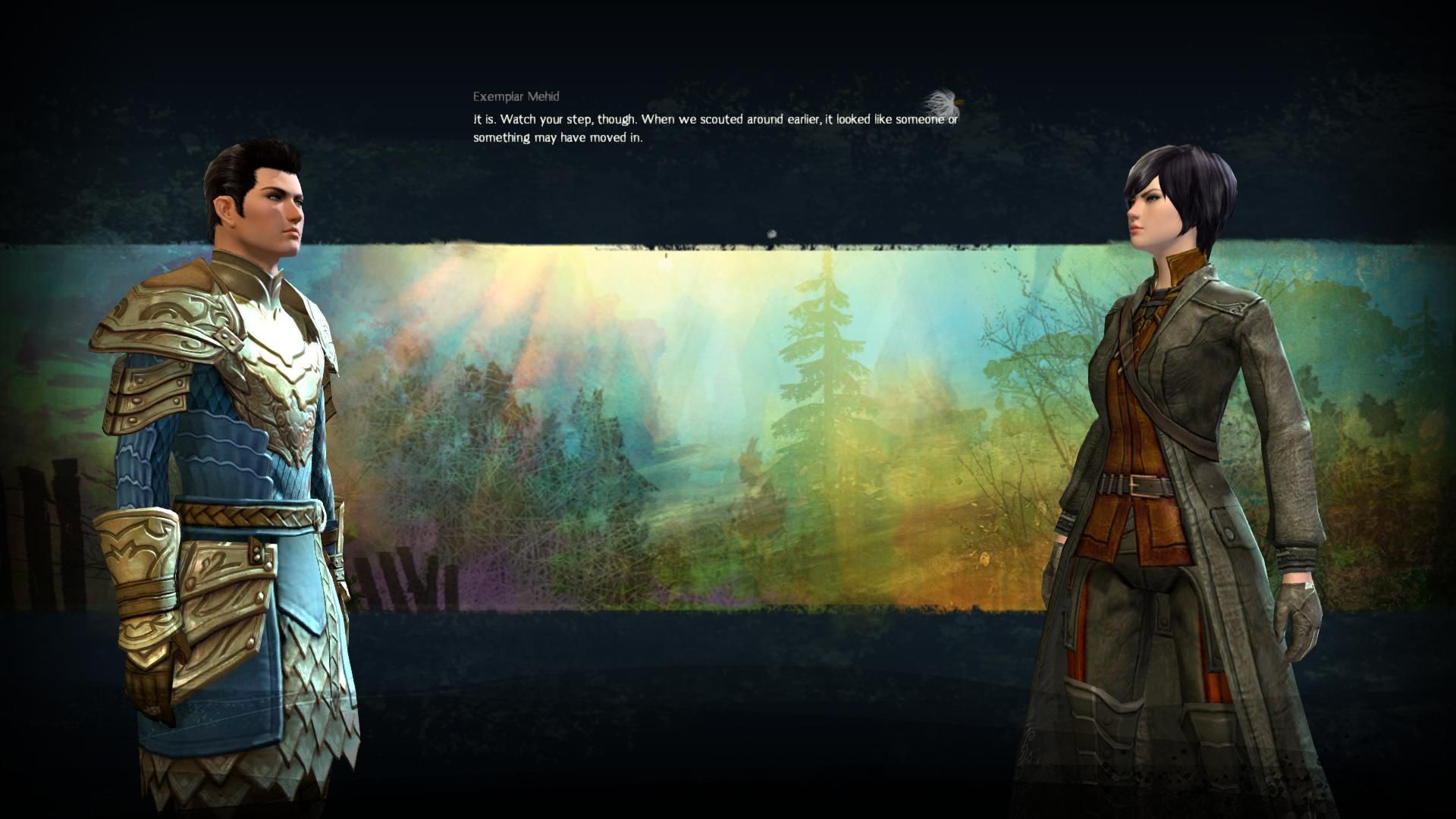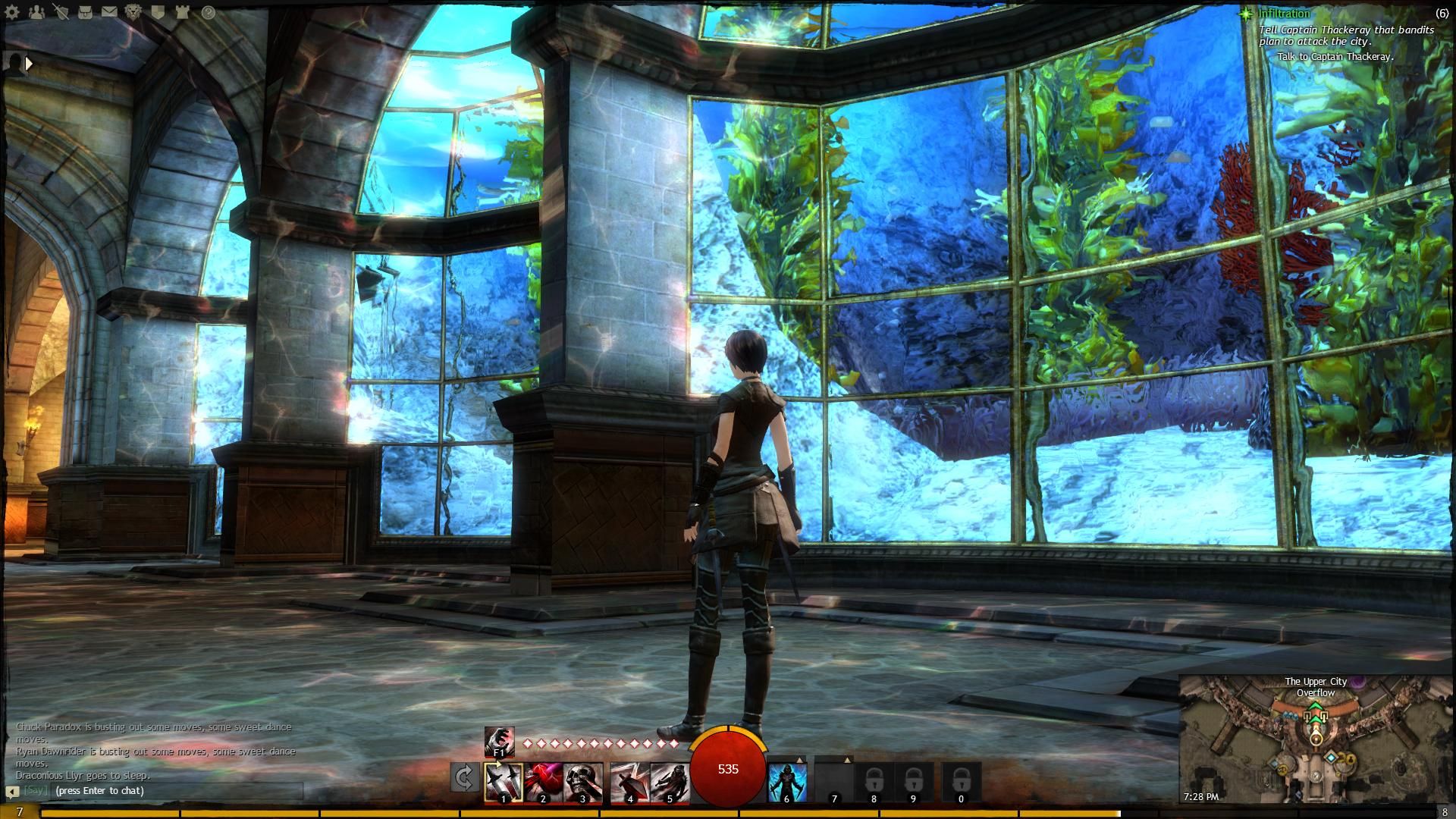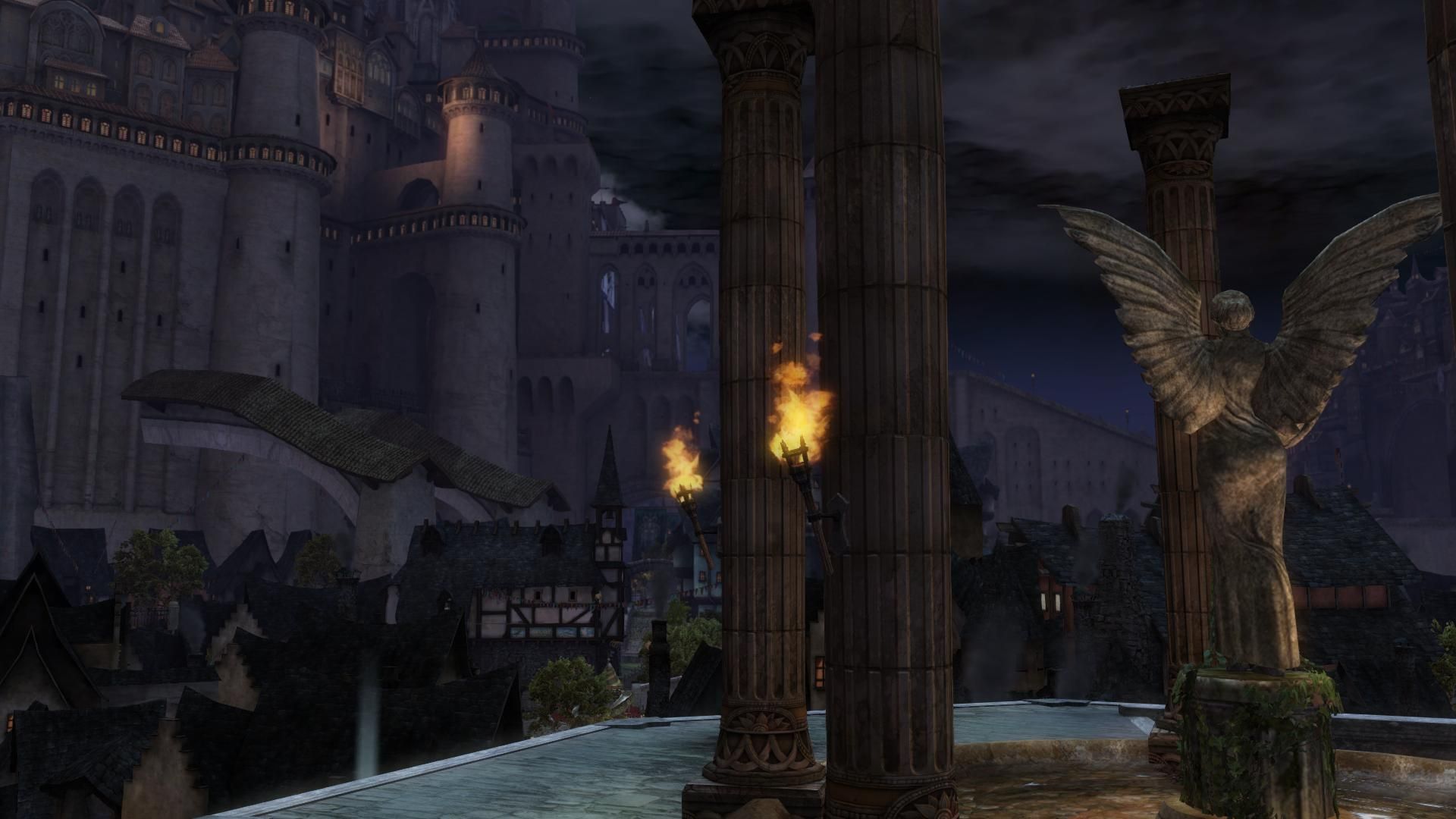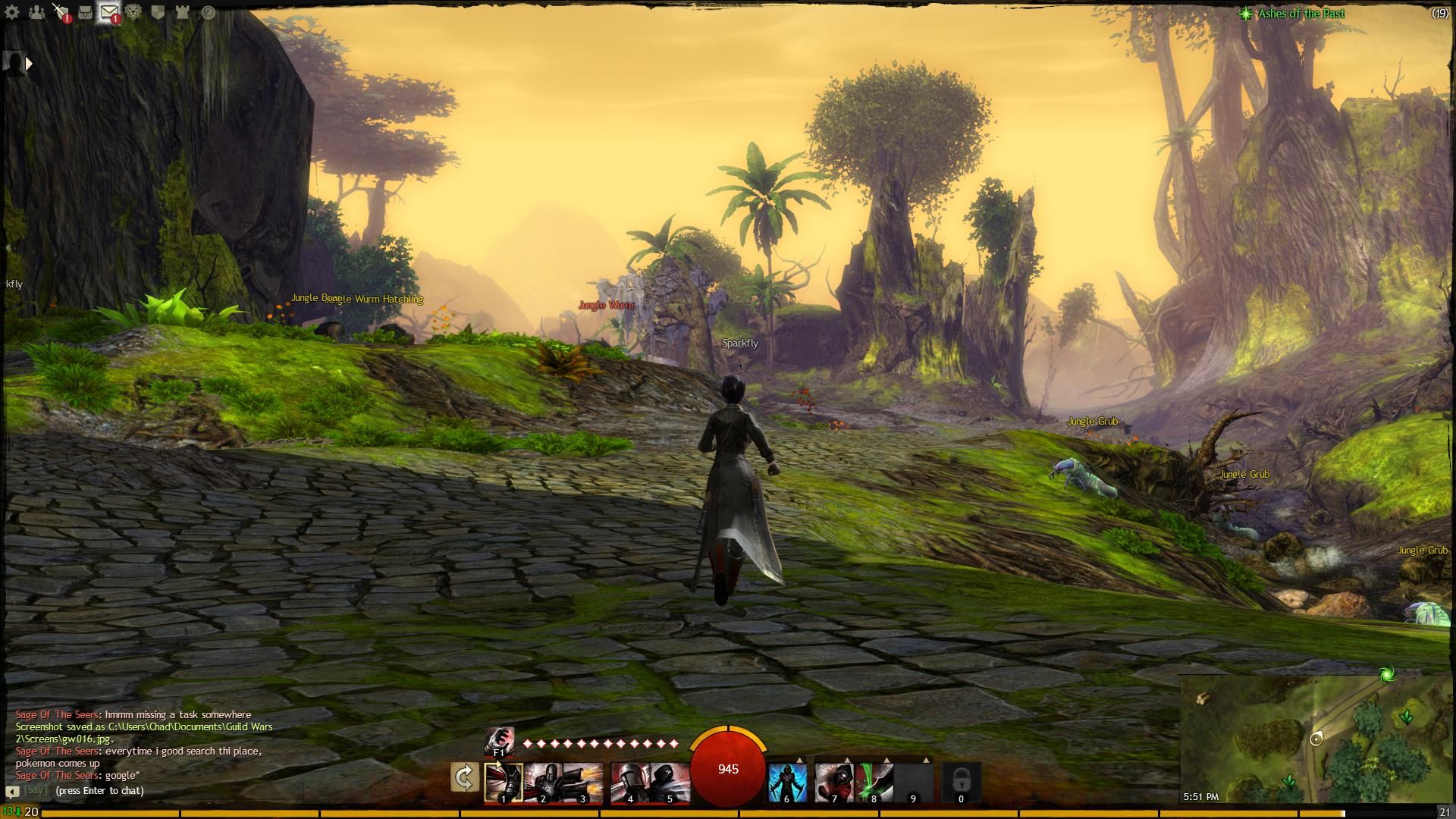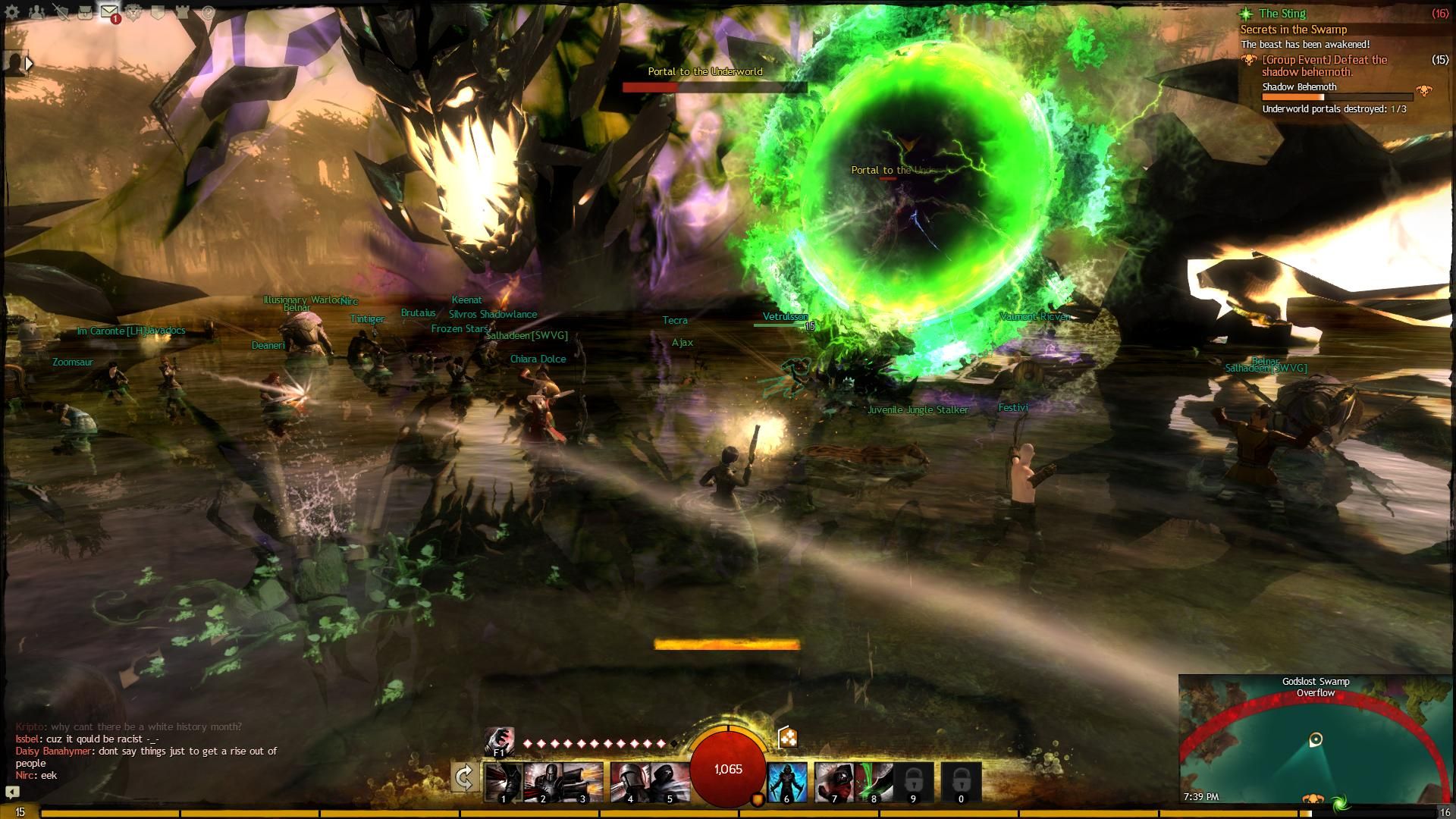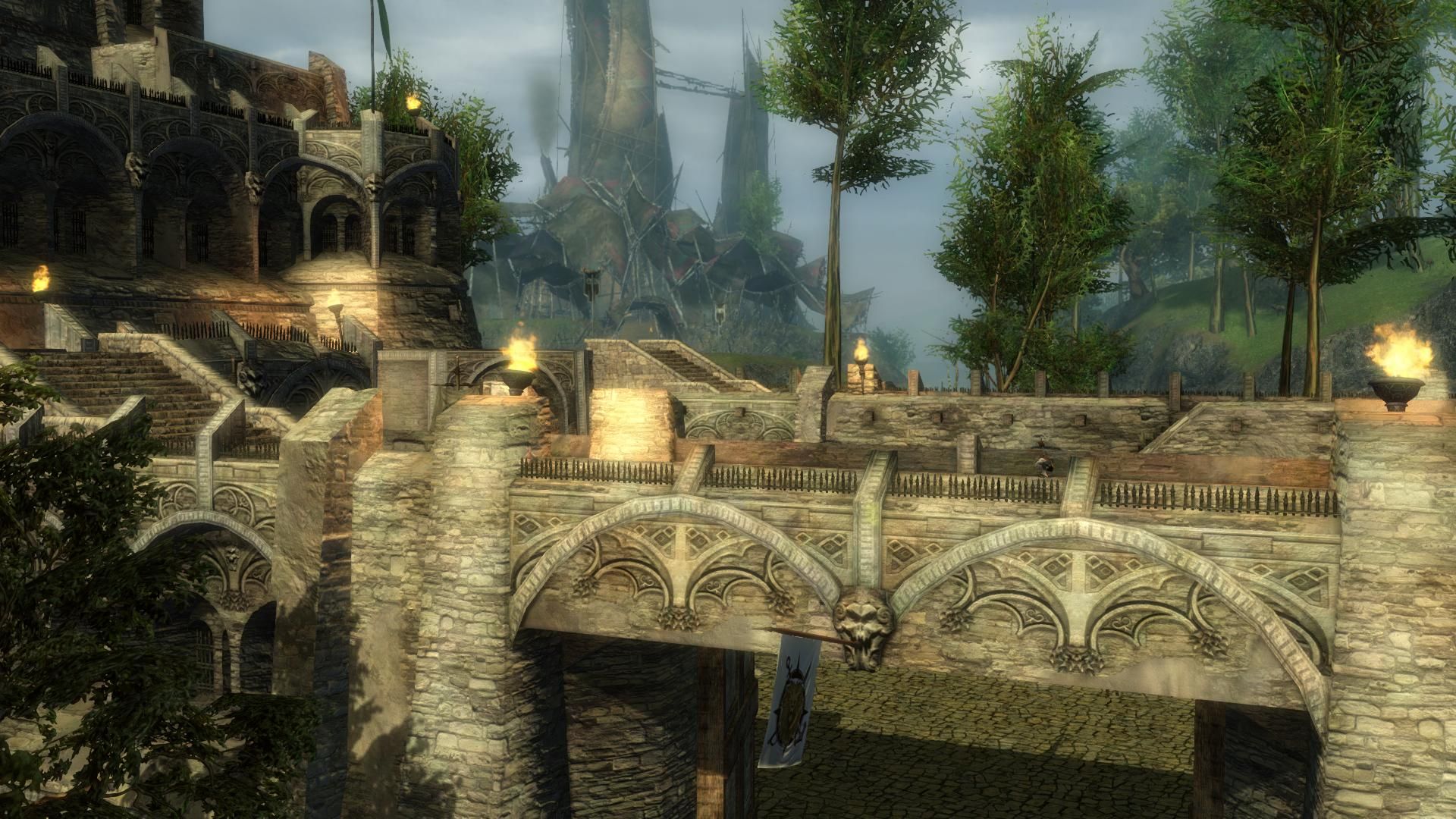Guild Wars 2 has been on many MMO gamers’ radar for quite a while, and has been touted by ArenaNet themselves as a big change to your average MMO formula. I’ll admit, I was really excited about this title, which departs from the half-filled MMO that the original Guild Wars was envisioned to be, and turns the franchise into a full-featured game within its genre, sporting many new features and a very robust PVE side, while still maintaining its PVP heritage.
One thing you have to realize about MMOs is that expectations and promises are usually never fully realized. Is that the case with Guild Wars 2? Even if it is, is the game still a boon to its genre, or is it something to be avoided?
These days, I’m not entirely sure that many people know about or expect story in their MMOs. While many have a rich lore, few tell their stories very well. It’s a curse of the genre, if you will. The vast majority of MMO players are used to the World of Warcraft-like story-telling, which is nothing more than mostly text that you have to read through (or not, as the case may be). ArenaNet, from the beginning, promised Guild Wars 2 would be different, that it would focus on our own personal story, and that personal story would be highly customizable right from the start.
To accomplish this, they have instituted a series of questions that you answer each time you create a new character. Some are similar across all races and some are race specific, but your combined answer to these questions generates that particular character’s back story and the way the early part of this personal story of yours progresses. I really think this is a cool concept to add to the otherwise iffy character creation process.
Customization isn’t overboard in GW2 like it is in other recent MMOs, however it is fairly robust. I would appreciate more face presets and hair styles, but who wouldn’t want more choice? However, the addition of those personal questions, where you sort of build your own characters’ background and set them up in the world, is pretty slick. However, this is a double-edged sword.
I come from a pretty heavy role-playing background, and to solidify all that – and specifically, as well – from the start is to rob a player of developing, expanding and intricately detailing the specifics of their characters’ life before that moment. For example, as a human, depending on the way you grew up (as a commoner, on the streets or around royalty), you’ll be automatically given a set of “friends”, which are set for you by the game, and it’s the same for each character you create. If I create two characters that are both from the commoner background, they will have exactly the same friends and will have nearly the exact same “growing up” experience. This doesn’t sit too well with me being an RP-er, and sort of undermines my interest in creating two characters of the same race, from a role-playing perspective.
However, few people actually role-play, and ArenaNet doesn’t help matters long very well, as they have no dedicated RP servers, so it’s possible the RP community in GW2 is spread out in various corners of the virtual world.
After character creation, you’re thrust into a “tutorial” segment, which seems to basically be built so you can get comfortable with the controls briefly before being put into the persistent world of the game. Here you’re also introduced to your race’s main story for the first 20 levels or so, which ends with fighting a pretty hefty monster of some sort. From a story perspective, it’s nice, however, from a gameplay perspective, the tutorial is greatly lacking, as it really doesn’t feed you enough information on enough aspects of the game to even be worthwhile, although it does let you build up your first couple skills with your default weapon – possibly more if you sit around and kill enough baddies in that segment of the game.
From there on you’re on your own, and tossed into the huge world of Tyria.
One of my biggest disappointments with the game is, in fact, the story. While there are parts that branch off based on your decisions throughout, there aren’t too many iterations. The first 20 levels or so is determined a lot by the decisions you chose during character creation. After that, there’s a point where you get to choose one of three factions to join. From that point on, all races who chose The Order of Whispers, for example, will be running the exact same quests. All characters, regardless of race, that choose The Vigil will be doing the exact same quests. So on and so forth. There isn’t as much variety as I expected.
Within some of the main-line quests themselves you have decisions, which only really affect that one quest and they’re a nice diversion, but nothing substantial. The stories themselves are highly predictable and cliché to the point of wanting to facepalm, especially early on in your leveling experience.
While I’m talking about story, I might as well point out that the voice acting itself is very erratic. A few voices are done pretty well (the Sylvari and Asura NPC voices, especially), however many are painful to listen to. In my opinion, you might as well have the audio turned off and be relegated to reading sub-titles if you play a Human, as most of their voice actors are downright horrible. Also, female Norn sound like they took the same actress they used for female Humans and had her strain her voice to the point that she sounded gritty, and it sounds entirely unnatural and forced.
Story cut scenes play out in a cool, stylistic manner, with a watercolor-style background and the character models superimposed over it. While it is nifty the first few times, it does get old and sometimes rather boring just having two characters chat back and forth in that manner. While player character models actually look pretty good displayed in this manner, many of the other characters you meet have weird eyes and look kind of demented. I’m not really sure what is going on there, but it’s a bit creepy at times, like they’re just rag dolls being animated by some evil spirit.
Overall, the stories themselves, the way they’re presented and the acting involved are just altogether underwhelming. ArenaNet really pushed this whole “personal story” idea, and it may feel like that if you are only going to play a single character. However, if you start making new characters to play different professions or races, you’ll quickly notice that the stories will soon meld together in a huge pot of similar-colored and flavored broth, which isn’t really that appealing.
Luckily for Guild Wars 2, the bulk of the rest of the game holds up decently well and is actually quite enjoyable. One of the most striking aspects of the game is the production design. While the models and textures in some cases can be kind of iffy, it’s hard to distinguish underwhelming texture from stylistic choice. Much of the distant textures tend to blur together with each other in sort of a watercolor-esque manner, which is actually quite appealing, to me, at least.
The design of the various zones and cities, for the most part, is very well done. The cities themselves are some of the best I’ve ever seen in an MMO, as they are multi-layered, intricate masterpieces of set design that really pull you into the game. Each of the five racial cities (in fact, each of the five races’ areas themselves) have a very distinct look and feel. You can go from the extremely regal-feeling human city of Divinity’s Reach to the steampunk world of the Charr’s Black Citadel to the nature-themed reserve that is The Grove. They all have a style of their own and are all equally fun to be in and explore.
The first time this really hit me was when I wanted to run around the outer promenade of Divinity’s Reach – it literally took me half an hour, with few stops. Then I went around it again and dropped another hour just exploring everything in only that portion of the city. I hadn't even touched the inner area, the second level or the various districts at that point. On top of that, of course, are all your key areas, which are marked on your map, such as landmarks, waypoints and viewpoints, which can be discovered for experience and map completion.
That is just one city, in one area of the world. There are six major cities total (five racial ones and the “hub”, which is Lion’s Arch), and many, many smaller towns and villages scattered around the various zones.
The attention to detail is simply astounding in the vast majority of cities and other zones. There’s a constant buzz in the cities that make them feel alive, with different NPCs chatting and carrying on, having different conversations in different places at different times of day.
As much as it seems like ArenaNet snubbed role-players with character creation and server selection, they seem to have designed many areas of the major cities in such a way that they become a paradise for such ones. Empty buildings abound, but it never feels like the world itself is empty. Places to congregate and RP are simply everywhere, as are vendors and other NPCs that you can incorporate into your role-play easily.
Even if you aren’t a role-player, though, the immersion is top-notch, and rivals even some single-player RPGs on the market today.
Aside from the “personal story”, ArenaNet was highly fond of promoting their quest system, which tasked you with just wandering the countryside looking to help various citizens and running in to dynamically-occurring events. While this is nothing new, it is something the typical MMO gamer may not be used to. In fact, the very first story quest of the game tasks you with going out and helping some random people, regardless of your starting race.
There are two different types of quests – heart quests and dynamic events. Heart quests are static people in the world and, when you get close enough to them, the quest pops up giving you four or five different ways to help them, followed by a bar detailing your progress. You can stick to one of those means, or participate in them all, but whatever you do toward that goal fills up the bar. When the bar is filled, you’ve “completed” that quest and are rewarded with experience and coin. Then, the NPC that you were helping becomes a karma vendor. Karma is a currency you acquire through participation in dynamic events, and these karma vendors are the main means by which you improve your gear during the leveling process.
I found that, typically speaking and with few exceptions, each of the several ways to complete one heart quest always falls into one of the standard MMO quest archetypes. There’s an option to kill something, an option to collect something, an option to talk to various NPCs in the area for some purpose, an option to take something to someone and so on and so forth. Naturally, if you participate in the killing portions, you gain slightly more experience because you get experience from killing the enemy. However, it also seems that certain tasks gain you more coverage toward your ultimate goal, as well. The harder aspects – such as killing an enemy – gain more, while the easier stuff – like feeding a cow for the farmer – may net you less progress.
The other form of quest is the dynamic event. These are not static, per se, but they do repeat. However, you do get a lot more variety. These are really where the meat of the “questing” system comes into play, and I say that because you get a lot more experience from dynamic events than you do heart quests, as well as the ever-important karma.
Event participation is based on a bronze-silver-gold scale, and you get rewards based on how much you participated, even if the event fails. These are cool because they happen at random intervals and can happen at the far-flung corners of the map. They also dynamically scale based on the amount of people around. I’ve done them solo and, while a bit more trying, are easily completed with a bit of finesse and skill at playing your chosen profession.
When a dynamic event pops up that is happening near you, you’re alerted with text on-screen and icons on the various maps, so you can pinpoint where exactly it is you need to go to participate. Many (in fact, I’d venture to say most) dynamic events are chains of events that play off each other. Once you complete one, it leads to another and possibly even another. Some culminate in group dynamic events, where you face off against a much stronger world boss. Some DEs are world bosses in themselves, and nearly every zone has a major boss that rises up to spread carnage at random times.
I’m a sucker for this stuff. I feel like, if I’m traveling through a zone and I run into one of these events, I almost have to participate unless I’m seriously in a hurry to do something, and that is great and shows the success of the idea surrounding these random occurrences.
All these events repeat, and there are a few out there that do get tiresome. However, many of them are designed with repetition in mind. I’m not saying they won’t ever get boring, because if you do the same thing enough times, it more than certainly will, there’s no way around it. However, many of the dynamic events are legitimately things that are likely ongoing, such as enemies attacking towns, caravans working their way from one town to another, guards going out on patrol and so on and so forth.
So, on one hand this can all be seen as nothing more than a modified quest grind, but, on the other, it’s a carefully controlled ecosystem of cause and effect, where the outcome of one event leads to another, and so on. Everything can be termed a “grind” if you word it the right way, but to me, the dynamic events, being the bulk of your leveling experience, never really got old, thus they never seemed like a grind to me.
Another awesome concept that is linked closely with questing is the fact that your character level scaled dependent on the zone that you are in. What this does is increase the amount of content you have available to you as you level up. Even if you’re level 60, if you go back to a level 10 zone that you haven’t quested in yet, you can still do heart quests and dynamic events and get plenty of experience to level up. While your gear is still level 60, you will seem more powerful, however your level itself (including health and other stats) will be devolved to the zone you’re in. I love this idea, I really do.
It was often that I felt like exploring and I’d venture into lower-level zones of another race and had more fun than I usually would because the content now matched my level, instead of being so over-leveled that the quest to explore meant nothing.
The one downside to this is that, unfortunately, rewards for these events – aside from experience – are not geared toward your actual level. Completing heart quests and activating karma vendors doesn’t feel like you’re accomplishing much because the items sold by the vendors could be nowhere near your actual level, aside from possible regional recipes and other ingredients that you might need for one of your crafting disciplines.
Another major push that ArenaNet has made during the entire build-up to release was how the combat was more action-oriented than your typical MMO. While they are partially correct, it definitely doesn’t go so far as to being complete and true action combat like TERA has, for example.
You’re limited to five abilities per weapon combination (and certain abilities can change depending on which weapons you’re using in your main hand and off hand, so you can mix and match to your liking). This can be a pro or con, to be honest, and it depends on the type of MMO player you are. Myself, I get overwhelmed by the plethora of abilities that some other MMOs give you, and, frankly, unless there’s a specific reason to use some skills, many go untouched. You can call it MMO OCD if you wish, as I like keeping a clean action bar and try not to stash any abilities there I rarely, if ever, use.
If you’re that type of MMO player, then you will certainly appreciate the limited number of abilities available. The other action bar slots in addition to those five are special abilities you can learn with skill points and then set at various level milestones, along with your individual healing ability of choice.
You gain skill points as you level, and you can also pick them up various other ways, such as completing skill challenges out in the world. Once you hit the level cap, all extra experience you gain gets converted into skill points, as well, and they’re used for more than just learning new skills.
My big issue with the small set of skills per weapon combination is just that – it’s a small number and it gets a bit boring after a while. If you really like using a certain weapon combination and really like the skills, then it’s natural to want to keep using it. But, at the same time, it does get tiresome always being confined to the same few skills for the majority of your leveling experience, one or two of which are meant to be used in specific situations only. So, it tends to happen that you spam two or three abilities over and over to kill your enemies, which, as I’ve stated, gets a bit boring at times.
The one part of combat that does make it pseudo-action-based is the fact that you can actively dodge out of the way of oncoming attacks, and this really is the crux of learning how to fight in Guild Wars 2. The enemies are tuned in such a way that you’re expected to learn how to dodge effectively.
You have a stamina meter, which will net you two dodges if you use them one after the other. This refills fairly quickly over time, but learning how to manage that resource, as well as time your dodges so you avoid the brunt of an enemy’s damage is the key to being successful at combat. It isn’t hard to learn, to be honest, but may take some getting used to for those who are more adept at the “stand in one place and faceroll” style of combat featured in many popular MMOs these days.
Finally, in the realm of combat, we have the fact that you have no class roles. What do class roles have to do with combat? Pretty much everything. In a typical MMO, you have the “holy trinity” of class roles – tank, healer, damage. In Guild Wars 2, every class can be a tank, healer and damage dealer all in one. You’re expected to be able to handle yourself, for the most part. Some classes do have a leg up when it comes to one of those roles than some others, but for all intents and purposes, there are no defined class rolls.
Yet, while this seems to diminish some strategy and teamwork, it adds some, as well, but in a different way. I’m not quite sure if it’s a good way or bad way, as I can see it leaning in both directions. See, all classes have the ability to resurrect fallen comrades and, in many of the large “raid sized” world boss fights I was involved in, it seems a large portion of the “strategy” of the fight was to find time to raise your fallen comrades while, at the same time, doing damage to the enemy and keeping yourself alive. It seemed to get to the point where it felt like part of the fight was to die.
I have to say, I don’t like this in my single-player RPGs, and I certainly don’t like that implied concept in my MMORPGs. The point should be to keep alive, but individual healing isn’t enough to keep you up through some one-hit-kills that many dungeon and world bosses toss in your face. This, in and of itself, is a huge downside to not having designated tanks to keep the inherently weaker classes out of harm’s way. Even if the tank had to heal themself, it would still be something. Having bosses flailing around aimlessly striking random victims isn’t particularly my idea of a controlled, fun fight.
I understand ArenaNet’s thought process behind removing the cookie-cutter class roles, but I’m not sure that could even work in today’s MMO environment, and I’m not sure it completely works in Guild Wars 2. While soloing and in PVP it may be fun, in group scenarios it is not.
Two other aspects of the game I’d like to touch on briefly are crafting and PVP. I’m going to be honest – I’m not a huge fan of PVP of any sort, however when I do PVP, I prefer large-scale battles with a fairly large contingent of players pitted against each other, with objectives to complete. This is exactly what the world-versus-world PVP in Guild Wars 2 offers, and why I enjoyed it so much.
Unlike other MMOs, to play GW2 PVP you’re automatically bumped up to level 80, given a standard set of gear and have all your weapon abilities unlocked. This allows for an even playing field on both sides, and relegates your success to a combination of two things – team coordination and individual skill.
The role-less class system in the game really shines in PVP, as everyone is pretty much self-sustainable. However, more than other aspects of the game, I feel you can “pick” your role in these larger battles. Most professions (classes) have some healing and some support abilities tied to certain weapons and, if that’s your cup of tea, you can stick to that weapon and those abilities in PVP. No one is stopping you. If you like being in the thick of things, you can do that, as well.
In a way, because of the lack of specific roles for each class, the PVP in GW2 is some of the best I’ve experience in any MMO throughout the years.
Lastly of the major game features, I’d like to touch on crafting. At its most basic, crafting in Guild Wars 2 functions much like that of other MMOs. You find recipes then find the ingredients, put them together and bam! – you now have your finished product. However, it does throw in a few twists and turns.
You do get experience while crafting – and a lot of it, too. At one time I read on the GW2 forums that each crafting discipline should net you roughly four levels of experience, if you take advantage of the discovery system. That’s a lot of levels you can gain just by crafting, if you so desire.
The discovery system itself is a way to go above and beyond the basic recipes you receive by simply skilling up, and it lets you mix and match different items to “discover” new recipes. These recipes can’t be found any other way.
On my main character I leveled both cooking and leatherworking. Of those, cooking was the most fun. Why? Because it was more challenging. Ingredients are spread all over the place in the field to harvest, from karma vendors, regular vendors, from mobs – simply all over. It was your job to stockpile these and combine them into items. Secondly, it was fun because you could use real-world knowledge to discover new recipes. For example, butter, flour and water combined make bread dough. Dough and yeast make bread. Bread and butter make toast. Bread, butter and garlic make garlic bread. I think you get the idea.
Discoveries in and of themselves bring exponentially more experience than simply skilling up the “old fashioned” way, so it is definitely to your advantage to spend the time putting items together on the discovery pane to form new recipes.
Being an MMO – and a very content-rich one at that – Guild Wars 2 contains way more content than I could ever hope to discuss in a review, without writing a library’s worth of words. It is simply one of the most feature-packed MMOs I’ve seen at launch. Put simply – there is more to do than you could ever have time for.
Unfortunately, the rough story layout and iffy combat at times bring a downer to the entire proceedings, but if you play an MMO for its entire package instead of just a couple “features”, you’ll get along quite swimmingly in Guild Wars 2.
It did have some launch issues; the only widespread issue that affected me in-game was the fact that the Black Lion Trading Post (the auction house) was down for the first week or two, but after that things were up and running just fine – just as they are now as this review is published, so I can’t criticize ArenaNet too much for that.
While Guild Wars 2 is a departure from the “lite MMO” that is the original Guild Wars, and may turn off some fans of that first title and its expansions, I much prefer the full-featured MMO approach that they have decided to go with here. The attention to detail in both the design of the world and the amount of content contained in just this initial release is really astonishing, and is probably the biggest advantage this game has to offer the prospective player. Well, that and the fact that there is no monthly fee after the initial purchase.
If you’re looking to get away from the typical and try something new, I’d highly recommend the game for content alone, as there is really something for everyone here, right out of the gate, without having to wait several patches down the line. Don’t expect a prize-winning story or a deep combat system, but if you can put those two issues aside, you’ll certainly enjoy exploring the revamped world of Tyria.
